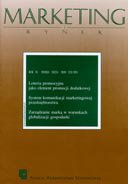Family firms are a diverse group of business entities. Regardless of the differences that exist among particular types of family firms, they share a common feature. It is the term familiness resulting from the interaction between the family system as a whole, the individual family members and the business itself. Although the functioning of family businesses is increasingly well recognised, research areas worthy of in-depth exploration can still be identified. The objective of this paper article is threefold: 1) to systematise knowledge about the familiness of business in the context of customer perception, 2) to identify directions for further scientific research in the area of the relationship between the family nature of the company and customer perception of the company and 3) to develop recommendations for practitioners in the area of family business management. In order to achieve these objectives, the literature scoping review method was used to analyse publications on family entrepreneurship selected from international databases. The research shows that familiness being an important factor positively influencing the perception of a company and its products by consumers is a significant source of competitive advantage. Therefore the factor of familiness should be more highlighted in the marketing communication of these companies. The results of the analysis also indicate that further research should focus on: 1) the relationship between the perception of family businesses and variables such as consumers' age, gender, lifestyle and their value system; 2) the relationship between the perception of family businesses and new trends in consumer behaviour, for example ethnocentrism and deconsumption, 3) the relationship between the perception of family businesses and attitudes towards these entities, 4) the cultural context of the perception of family businesses.
Keywords: family businesses; familiness; perception; scoping review

